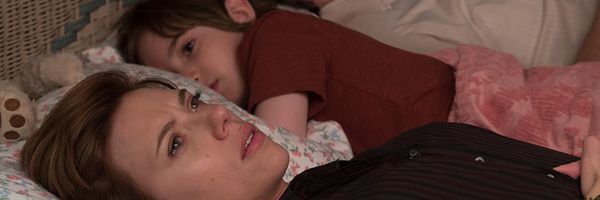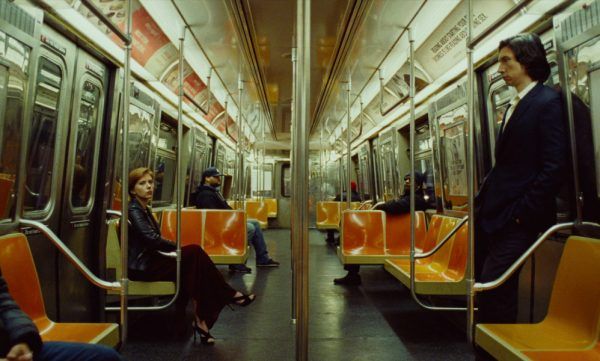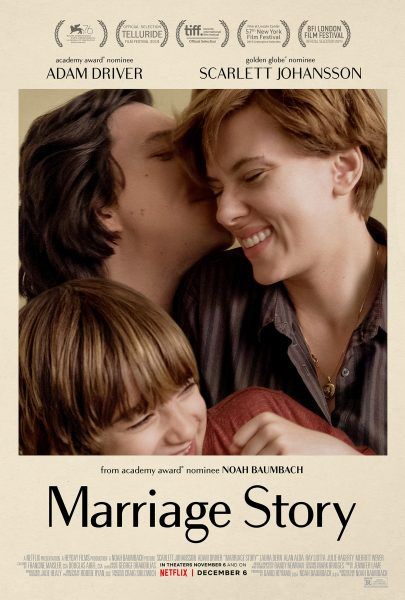This is a re-post of my review from the 2019 Toronto International Film Festival. Marriage Story is now streaming on Netflix.
One of the best things I can say about Noah Baumbach’s excellent new movie Marriage Story is that even if I wasn’t a child of divorce or if I wasn’t married now, I’d still find it emotionally overwhelming because he makes me care so deeply about the two people at the core of this story. Marriage Story doesn’t function as a screed against marriage or divorce. The film isn’t trying to make its divorce stand in as a prime example for all divorces. What Marriage Story shows is that divorce is where love and hate collide, and ending a marriage isn’t as simple as flipping a switch. Led by astounding performances from Adam Driver and Scarlett Johansson with some terrific supporting work from Laura Dern and Alan Alda, Marriage Story shows the emotional warfare between a couple not in broad, melodramatic strokes, but where the ground is constantly shifting beneath everyone’s feet.
Nicole (Johansson) and Charlie (Driver) Barber have already agreed to a divorce when the story begins. Nicole, an actress who was a vital part of the plays that Charlie, the director, made with their theater company, now wants to pursue a career out in Los Angeles, but Charlie wants to stay in New York City. Although they initially agree to no lawyers, Nicole decides she needs an advocate for her interests and hires the brutal and effective Nora (Dern). Charlie, not wanting to lose total custody of their son Henry (Azhy Robertson), then hires his own representation (Alda). As divorce proceedings continue, we see the resentments and slights that have built up over the course of the marriage come pouring out. What the Barbers intended to be an amicable parting eventually devolves into all-out war as a desire to “win” overshadows life after marriage.
Baumbach, working from memories of his own divorce, doesn’t simply approach this as “divorce is bad” even though things get emotionally ugly. Marriage Story doesn’t try to hold up an unhappy marriage as better than no marriage at all, nor does it ask you take sides. If anything, Baumbach is much harder on Charlie than he is on Nicole, but again, this isn’t a story about who was right and who was wrong. This is a story about the fallout. The movie devotes great care into showing not only how these two people have drifted apart, but also why they’ve drifted apart and why they can’t turn back from this emotional grinder. Rather than create some Rashomon-like narrative where you try to unpack what happened in the marriage, Marriage Story investigates what happens when the marriage is over and the difficulty in moving forward.
Although it’s easy (and fun!) to blame the lawyers, Marriage Story provides nuance to aspects of divorce that people who haven’t been divorced probably don’t think about. For example, it’s not just that divorce lawyers cost a fortune, but as Charlie’s attorney points out, you have two people fighting to stay close to their child and bankrupting that child’s college fund as a result. That’s incredibly dark and twisted, but it’s also a mundane reality. Charlie and Nicole don’t care that much about their personal property, but they obviously care deeply about Henry’s future. Charlie even observes that if Nicole is granted custody, he won’t get to see his son and he’ll stop being a parent. The stakes could not be higher and there is no simple resolution.
Everyone plays his or her character to perfection. Johansson has never been better, playing her most mature character to date. She has a long monologue where she recaps her view of the marriage, and the levels that Johansson has to go to tell this story—the story of her marriage as she experienced it and why it had to end—is powerful and relatable. She doesn’t cast Charlie explicitly as a villain or herself as a hero, but her matter-of-fact telling belies the emotional currents that have worn away at her over the years. Dern is electric as Nora, a shark of a lawyer who will go to hell and back for her client, but also with no emotional investment in the outcome. She’s callous in all the right ways for her profession, and in the hands of a lesser actor, she would just be a caricature, but with Dern, we just have to acknowledge that Nora is amazing at her job.
But the performance I can’t stop thinking about is from Driver. I thought Driver had already given one of the best performances of the year with his turn in The Report, and now he’s already topped himself with his work here. If I have one minor qualm with Marriage Story, is that after focusing largely on Nicole at the beginning, more of the story is given over to Charlie. And yet with Driver’s performance, I can’t really complain too much because he’s just an absolute powerhouse where he puts everything he has into showing the character’s emotional complexities and shortcomings. Even if you “blame” Charlie for the divorce (even though the film is indifferent to notions of blame in these circumstances), Driver keeps our sympathies not because Charlie is such a great guy but because the character is so fully realized and articulated. It’s possible I’ll see a better performance this year, but Driver has set a very high bar for 2019.
Marriage Story is not an easy movie, but it’s not an emotional grind either. There are moments of levity and moments of love. If we didn’t care about these characters and their divorce so much, it would be easy to check out, but Baumbach’s movie is endlessly compelling not because of hatred, but because of love. This isn’t some slow-motion car wreck, but the story of two people who loved each other now going through a process that demands their hatred, the kind of hatred you can only show to someone you loved with all your heart. Yes, it can be devastating to watch at times, but that’s because this story is worth a damn and I’m so glad Baumbach decided to tell it.
Rating: A-



